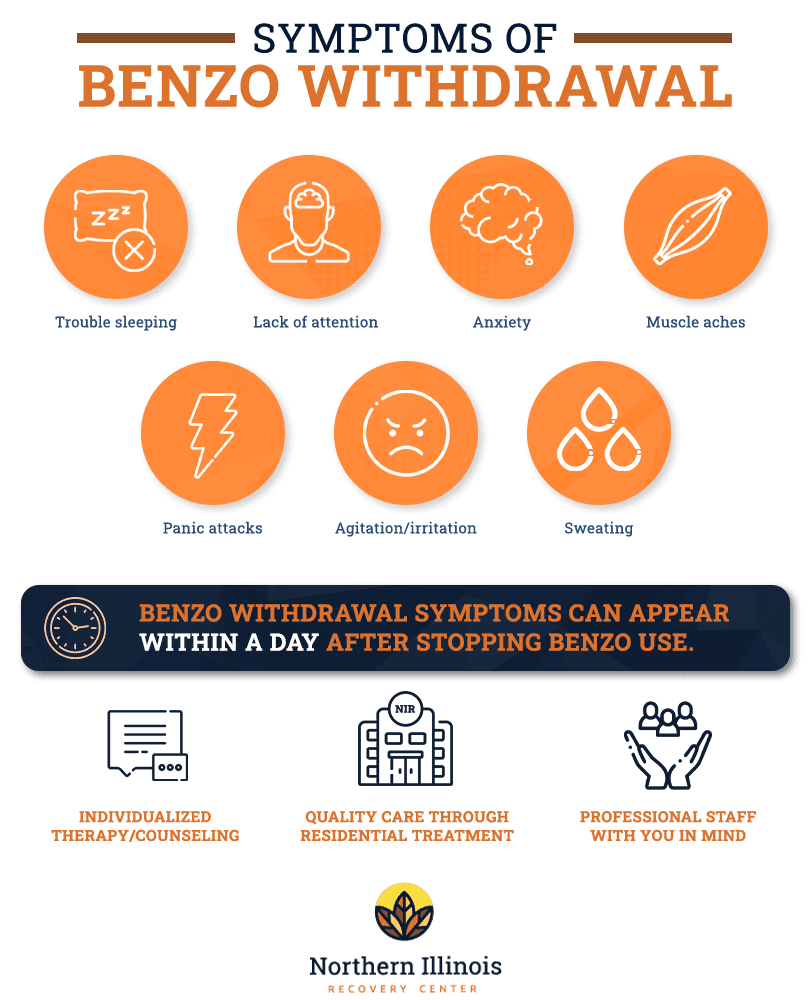Benzos are a prescription drug that is extremely addictive. Those who use benzos, whether medically or recreationally, tend to build a tolerance towards them. This happens after a long period of time. The more somebody uses benzos, and the longer the amount of time that goes by, the higher the tolerance a person develops. The reason a person develops a dependence is that after a while, the body and mind get bored and want more. This has the potential to lead to addiction.
If becoming sober was as easy as stopping their usage of the drug, people probably wouldn’t experience withdrawal symptoms. The most difficult part about withdrawal is that it has no respect for those who aren’t using benzos abusively. Some people are prescribed benzos and wind up dependent on the substance; this is why doctors are oftentimes hesitant to prescribe benzos. Benzos have extreme withdrawal symptoms, and it only takes a short time for the body and mind to become dependent.


- Irregular sleeping patterns
- Trouble sleeping and staying asleep
- Irritation and agitation
- Anxiety
- Panic attacks
- Sweating
- Headaches
- Muscle aches
- Tremors
- Lack of attentiveness
- Vertigo
Benzo withdrawal is extremely painful and uncomfortable. What’s worse is that if a person quits cold turkey, it has the potential to be life-threatening. When a person has been taking benzos for a long period of time, they tend to experience more intense withdrawal than those who did not. The withdrawal process for benzos varies from person to person, but there are typically a few stages.
How Long Does it Take to Experience Benzo Withdrawal?
Why Are Benzos Prescribed if they’re so Bad?
How Do You Treat Benzo Addiction?
Medically assisted detox is a way to come off of drugs with the help of experienced medical professionals. Getting clean isn’t easy, and this can often discourage someone from continuing treatment. Thankfully, medically assisted detox reduces withdrawal discomfort. This offers a path to coming off of drugs comfortably, which lessens the likelihood of relapse.

How Difficult is it to Detox from Benzos?
How Long Does Detox from Benzodiazepine Last?
What is the Withdrawal Timeline for Benzodiazepines?
Most people will start to feel the effects of benzo withdrawal within the first few days after stopping their use. Symptoms tend to peak around day 4 or 5, and then gradually begin to improve over the next week or two. However, some people may continue to experience symptoms for several weeks or even months.
Withdrawal from benzodiazepines typically occurs in three phases: early, middle, and late.
The early phase of withdrawal usually begins within a few hours to a few days after the last dose of the drug. Symptoms during this phase can include anxiety, irritability, and insomnia.
The middle phase of withdrawal typically occurs a week or two after the last dose of the drug. Symptoms during this phase can include depression, fatigue, and difficulty concentrating.
The late phase of withdrawal usually begins a month or two after the last dose of the drug. Symptoms during this phase can include anxiety, insomnia, and flashbacks.

What is Benzo Tapering?
Some people may do well with a slow and gradual taper, while others may need to taper more quickly. The most important thing is to work with a doctor or other healthcare professional to create a plan that will minimize withdrawal symptoms and maximize success in quitting benzos.
What Medication is Used in Benzo Detox?
What Happens After Benzo Detox?
After-care is imperative when it comes to long-term sobriety and success. This helps those who have just finished treatment receive support from others. The more community a person has after their treatment has concluded, the more likely their long-term recovery success is.
Additional Treatment for Benzo Addiction
- Inpatient residential treatment
- Outpatient treatment
Every person has a unique history and background; their treatment should reflect that. Individualized options are always the proper way to approach treatment for addiction. When it comes to substance use disorder involving benzos, the right approach is imperative. It could mean the difference between long-term sobriety and relapse.




